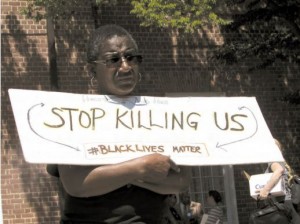
A demonstrator holds up a sign during a rally at the Thurgood Marshall memorial in Annapolis on July 23. Advocates and residents had come to Annapolis that day to press for law enforcement reforms in Maryland. (Photo by Roberto Alejandro)
“I have to be honest and say I’m not pleased to be here. I’m tired of being here. I’m tired of coming down here,” said Rev. Dr. Heber Brown at a recent law enforcement reform rally in Annapolis.
Advocates and residents had gathered at the Thurgood Marshall memorial in the state’s capital once again to demand that lawmakers in Annapolis pass meaningful reforms that would ensure police accountability to communities around the state, and especially to communities of color. Speaking at a rally before a town hall hearing on law enforcement issues scheduled by the Maryland General Assembly Public Safety and Policing Workgroup—which is reviewing the state’s law enforcement policies in the aftermath of Baltimore’s unrest over the death of Freddie Gray—on July 23rd, Brown expressed the sentiment many were feeling that day who had repeated this exercise so many times during the previous legislative session.
“Fannie Lou Hamer said years ago, ‘I’m sick and tired of being sick and tired,’ and I have to confess today that I am where Fannie Lou Hamer was. I am tired of coming down to Annapolis, trying to convince lawmakers to do what is right by the citizens of the state of Maryland,” added Brown later.
The phrase ‘dog and pony show’ was among the most common ways advocates and residents present for the town hall described the day’s events. And while Del. Curt Anderson (D-Baltimore City), one of the co-chairs of the workgroup, assured those assembled at the start of the meeting that “we understand that a problem exists,” some who testified before the workgroup wondered why such a town hall was necessary if that was truly the case.
“I’m glad for the opportunity to be able to have this conversation,” said Rev. S. Todd Yeary, political action co-chair for the MD NAACP, “though I must say up front that the state conference is a bit concerned that we’re having to have this conversation at all. There’s been a significant deterioration in the confidence of the citizens in the ability of law enforcement to not only protect property and life, but to protect their constitutional rights.”
Tawanda Jones, the sister of Tyrone West, the Baltimore man who was killed by police while being taken into custody in July 2013, addressed the need to once again tell the story of her brother’s death at an Annapolis hearing.
“This is the foolishness and the heartbreak that our families go through at the end of the day, when the timer goes off, and y’all go back to be with your families, we’re stuck with this hurt and pain, and all we’re asking for is accountability and transparency, and holding these people accountable to the fullest extent of the law,” added Jones later.
Marion Gray-Hopkins, who lost her son to police violence in1999, and who led the rally before the start of the town hall, also spoke of the pain suffered by families of police brutality victims.
“I wouldn’t want anyone to have to go through what I’m going through and the pain that I feel every morning that I wake up, so I fight for change and will do so until change comes,” said GrayHopkins.
But whether change will come is exactly the question animating the frustration of many advocates of law enforcement reform, and both Brown and Jones attacked the make-up of the workgroup for failing to include Del. Jill Carter (D-Baltimore City), viewed by many as the premiere champion of law enforcement reform issues in the state, and certainly in Baltimore. Brown also highlighted the fact that a number of workgroup members were often hostile to the idea of reform during the last legislative session.
While he did not name any legislators specifically, the workgroup includes lawmakers like Sen. Bobby Zirkin (D-Baltimore County), Sen. Wayne Norman (R-Harford and Cecil Counties) and Del. William Folden (R-Frederick County), all of whom expressed resistance to various law enforcement reform measures over the course of the previous legislative session, which ended April 13th, the day after Freddie Gray sustained the injuries at the hands of police that resulted in his death on April 19th.
This resistance has also informed the exasperation of many who have fought for change where police reform is concerned, a sentiment Brown spoke to at the rally when he said, “Listen, they better get it right this time. You better get it right this time. . . . Hogan, Miller, and Busch, these three white men should not be setting the timetable as to when Black and brown people will get justice. They should not be in the position to set the timetable as to when we will get justice. We’re here today to say listen, time is real short.”

